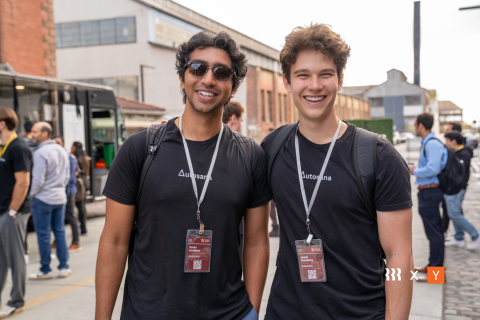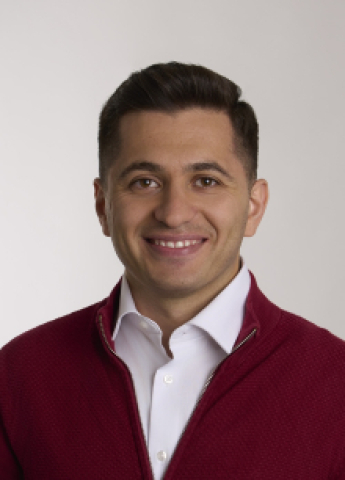Recent News & Accomplishments
2026
Department of Computer Science alumni Yuvan Sundrani and Jason Steinberg build Autosana, an AI testing platform accepted into Y Combinator’s 2025 batch.
When mobile & web apps release updates, engineers must ensure new features work properly without disrupting existing ones. That process often involves writing and maintaining detailed test scripts, which frequently break as apps evolve. Fixing those scripts can slow development and consume valuable engineering time. University of Maryland Department of Computer Science alums Yuvan Sundrani (B.S. ’24, computer science; B.S. ’24, information science) and Jason Steinberg (B.S. ’24, computer science; B.S. ’24, general business) saw those challenges firsthand. In 2025, they launched Autosana... read more
Modern cloud services rely on telemetry—the collection, transmission, and analysis of data—to monitor and ensure that systems are healthy, performant and reliable. But gathering and analyzing this data at scale is often expensive and slow, forcing engineers to balance trade-offs between performance, cost and accuracy. Zeying Zhu, a fifth-year computer science doctoral student at the University of Maryland, is working to overcome these limitations. “Modern telemetry systems should be high-performance, scalable and inexpensive, but today’s solutions struggle to achieve all three at once,” she... read more
He discusses his path into computer science, research on cloud infrastructure and mentoring students in systems research.
Alan Zaoxing Liu , an assistant professor of computer science at the University of Maryland, studies how computing systems manage and move data at scale. His work focuses on designing data systems that support large cloud platforms and artificial intelligence workloads, with an emphasis on reliability, performance and trustworthiness. Liu received his Ph.D. in computer science from Johns Hopkins University in 2019 and completed postdoctoral research at Carnegie Mellon University’s CyLab. At UMD, he leads the FROOT lab, where students build faster, more reliable computing infrastructure. In a... read more
A new partnership between NVIDIA and Universal Music Group will harness Music Flamingo’s groundbreaking ability to discern the finer points of music.
Music Flamingo , developed by University of Maryland and NVIDIA researchers, is at the center of a recently announced partnership between NVIDIA and Universal Music Group (UMG) that aims to revolutionize how fans discover songs and how musicians create them. The partnership “unites the world’s leading technology company with the world’s leading music company in a shared mission to harness revolutionary AI technology to dramatically advance the interests of the creative community,” said Sir Lucian Grainge, UMG’s chairman and CEO, in a statement on the deal. Streaming services’ current music... read more
An undergraduate and a high school student among those presenting at IEEE ICRA 2026 in Vienna.
Student researchers who participated in the University of Maryland’s Research Experiences for Undergraduates (REU) program, known as REU-CAAR, have had their work accepted to the 2026 IEEE International Conference on Robotics and Automation , scheduled for June 1 through 5 in Vienna, Austria. The paper was authored by Yufan Chen , an undergraduate student at the University of Southern California; Arnav Bali , a student at South River High School in Edgewater, Maryland; UMD alumni Angela Liu (M.S. ’24, computer science) and Laura Zheng (Ph.D. ’25, computer science); and Distinguished... read more
While machine learning has transformed everything from health care to natural language processing, understanding the limits and capabilities of this AI-based technology requires careful theoretical study. Han Shao , who joined the University of Maryland last fall as an assistant professor of computer science, is currently focused on bridging theory and application to understand what machine learning algorithms can—and cannot—do. “I am trying to understand the limitations of algorithms and figure out how to build better ones,” says Shao, who holds an affiliate appointment in the University of... read more
How CS major Amedeo Ercole helped develop a minimalist social app.
Social networking platforms are built to keep users scrolling, liking and reacting, often delaying direct interaction in favor of curated feeds. For Amedeo Ercole , that structure raised a simple question: What if conversation came first instead? A senior majoring in computer science at the University of Maryland, Ercole has spent the past year helping to develop Vex , a mobile app that connects users around shared interests with as few interactions as possible. The platform allows users to state what they want to talk about and be matched with someone interested in the same topic, removing... read more
Anirud Aggarwal, Grace Cai and Steven Su were named honorable mentions for work spanning computer vision, micro-mobility modeling and privacy research.
Three undergraduate students from the University of Maryland’s Department of Computer Science have received honorable mention recognition from the 2025–2026 Computing Research Association (CRA) Outstanding Undergraduate Researcher Award . Recent graduate Anirud Aggarwal (B.S. ’25, computer science ; B.S. '25, mathematics ) and seniors Grace Cai (B.S. '26, computer science; B.S. '26, physics) and Steven Su (B.S. ’26, computer science) were recognized for research projects addressing challenges in computer vision systems, micro-mobility modeling and online privacy and security. The CRA... read more
His broader goal is to expand his research into actionable solutions to improve human health.
From understanding our genomic traits to monitoring how diseases spread, genomic data has become a powerful tool for science and medicine. But analyzing this data quickly and accurately remains a major challenge. For example, sequencing human genomes on a global scale can often involve millions of gigabytes data. Can Firtina, who joined the University of Maryland in Fall 2025 as an assistant professor of computer science, is developing algorithmic and hardware-based solutions to make that process faster and more accessible. He recently received an affiliate appointment in the University of... read more
Jim Purtilo discusses why protecting data now matters as quantum computers move closer to real-world use.
There has been speculation for several years that quantum computing would deliver a revolutionary advance, capable of solving complex problems exponentially faster than classical computers. It could also tackle problems that have so far been too complex for even the most powerful supercomputers. That has the potential to design new technologies, but there are also concerns that it could break virtually all current encryption, threatening sensitive data, financial systems, and critical infrastructure. 2025 has been described as the year of “Quantum Awareness,” with the United Nations... read more









